Figure 1. Xenobiotic response regulatory factors are specific to one or more cytoprotective pathways.
Animals carrying promoter::gfp fusions to genes in key cytoprotective responses were exposed to stimuli that normally induce the expression of these constructs. These include hsp-4, an ER UPR gene induced by treatment with tunicamycin (column 1), hsp-6, an Mt UPR gene induced by treatment with antimycin (column 2), sod-3, an oxidative stress response gene induced in a temperature-sensitive daf-2 mutant background (column 3), and gst-4, an oxidative stress response and detoxification gene induced by treatment with sodium azide (column 4). Gene inactivations found to inhibit the expression of one or more of these gfp fusions include RNAi of wnk-1 (row 2, suppresses hsp-4 response), phi-50 (row 3, suppresses sod-3 and gst-4 responses), ima-3 (row 4, suppresses hsp-4 and hsp-6 responses), gob-1 (row 5, suppresses sod-3 response), elt-2 (row 6, suppresses hsp-4, hsp-6, sod-3 and gst-4 responses), let-70 (row 7, suppresses hsp-4, hsp-6, sod-3 and gst-4 responses), nekl-2 (row 8, suppresses gst-4 response), mdt-26 (row 9, suppresses hsp-4, hsp-6 and gst-4 responses) and pas-3 (row 10, suppresses hsp-4, hsp-6 and sod-3 responses). Representative images of conditions with decreased cytoprotective gene expression are outlined in red, and the fold reduction in GFP expression, quantified in Table 1, is shown in the lower right. None regulate the expression of the constitutively expressed gene fusion psur-5::gfp and only elt-2 regulates expression of the heat shock responsive gene fusion phsp-16.2::gfp, suggesting specificity to stress functions (Table S4). Endogenous gene expression was measured by qPCR (Table S5).

